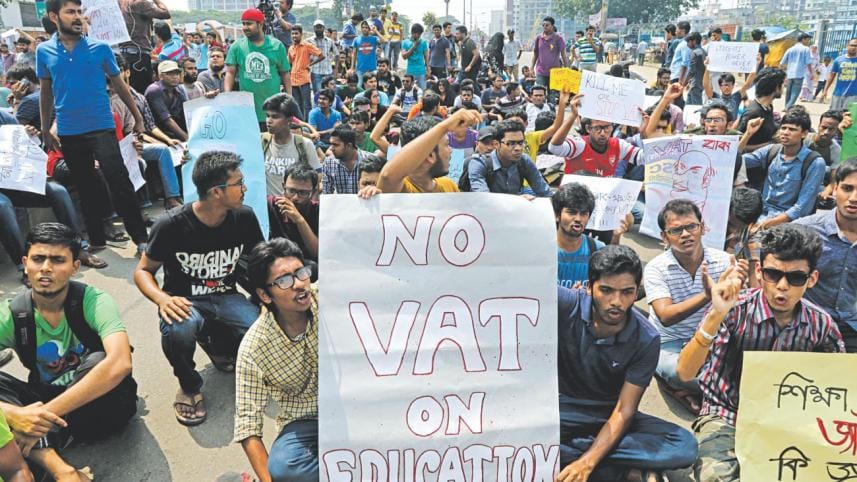Power is Knowledge is Power

Love him or not, you cannot but be awestruck at the sheer bluntness, call it lack of guile, of Suranjit Sengupta for his candid pronouncement to government employees within 24 hours of their pay hike. Said the former Railways Minister: "Your salaries have now been doubled. People would expect a four-time increased service from you from now on, not charging four-time bribes". Mr. Sengupta said this at Dhaka while speaking as the chief guest at a discussion on current politics organised by Bangabandhu Academy at the Kakrail auditorium of the Institution of Diploma Engineers.
The senior Awami League leader also said, "The government staff should have to keep in mind that they have been drawing salaries from people's money. So, they have to pay back the people in double regarding their work discharging their duties with skill and transparency." About the statement of the minister without portfolio, there has been no official protest from any quarter, bribed or not. One gets the feeling Mr. Sengupta is now abundantly confident about his innocence in the 2012 bribery scandal, for he fears no backlash despite such open aggression.
On another front: Says the educator from atop a stony mountain in ancient Greece, 'We have taught thee Economics for the past several centuries and yet after acquiring little knowledge thee regrettably accuse those very teachers of lacking knowledge'. Tch! Tch! Finance Minister AMA Muhith said last Tuesday that the country's most educated section was demonstrating for the "lack of knowledge". Without being prompted by any external forces, least of all Hilary Clinton, who herself is smothering under a pile of old emails, public university teachers demanded an 'apology' within 24 hours, and the finance minister in his characteristic dignity and wisdom delivered in good time, saying he was sorry because his statement was 'insulting'.
Muhith Shaheb is a courageous person and previously too he had apologised, the rarest quality among our ministers, past and present. On Sep 6, 2012, facing a barrage of criticism both in and outside parliament, finance minister Muhith repented his remarks on the Sonali Bank loan scam, that the Taka 4,000 crore swindled by Hall-Mark Group was a paltry amount. "I should not have made the remarks…. I offer my apology. I'm withdrawing the remarks… There is a huge hue and cry about the forgery. I think I am now the most hated person in the country," he told the House.
Back to Mr. Muhith's more recent comment, he may have saved the day this time by adding 'relevant' before 'knowledge'. However, the usually flamboyant minister is spot on with regard to some teachers who do little to enhance their academic ability once they are employed. They simply grow old and are promoted, and they grow older until one day they are 'qualified out of sympathy' to become professors and more.
On a third front, since July 4 (no relation to US fireworks) private university students have been agitating against the 7.5 percent VAT on tuition fees imposed in line with the government's 2015-16 budget. This one became nasty: students and police clashing and protesters bloodied on Wednesday, and last Thursday Dhaka was brought to a standstill. The National Board of Revenue (NBR) announced rather belatedly the same day that VAT was supposed to be paid by a university and not its students.
The lack of knowledge here has been in not taking the private universities on board. The NBR, along with the University Grants Commission, should have had grooming sessions with appropriate university officers, explaining to them what it is now expounding in the face of the blockade, and the students need not have to know about it at all because it does not concern them.
The High Court has called to question the legality of the surcharge and it will be seen whether education after all is a commodity, or not. Lost in the melee is the fact that English-medium school children (okay their parents) are paying 7.5% VAT, and that too should stop if we go by NBR's most recent circular.
The danger here for our students and parents lies in the possibility that after the private universities, there may also be taxation imposed on tuition fees of private colleges, schools and kindergartens. I must add here that education at any level and by whatever means, private or public, is not an article of trade, and therefore not taxable. If need be, again only if the law permits, the government could perhaps derive taxes from land, buildings and other assets developed by private universities.
It is because of sincere private philanthropy that many of our children are finding a genuine desk under an authentic shade. Over the years, the lustrous performance of many private school students and university graduates is manifest demonstration of the system's success, despite there being some big bad apples in the cart.
Let us bring the students back to a VAT-less classroom.
The author is a practising Architect at BashaBari Ltd., a Commonwealth Scholar and a Fellow, a Baden-Powell Fellow Scout Leader, and a Major Donor Rotarian.




 For all latest news, follow The Daily Star's Google News channel.
For all latest news, follow The Daily Star's Google News channel.
Comments